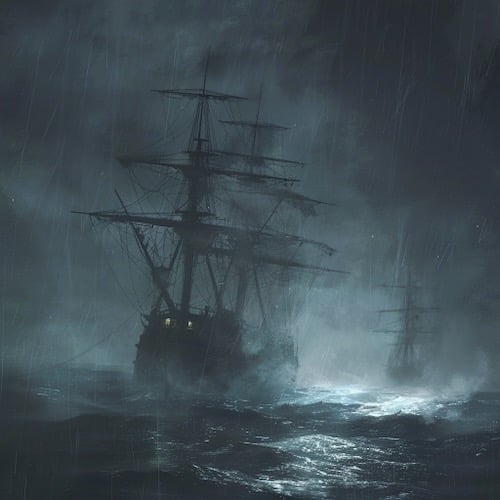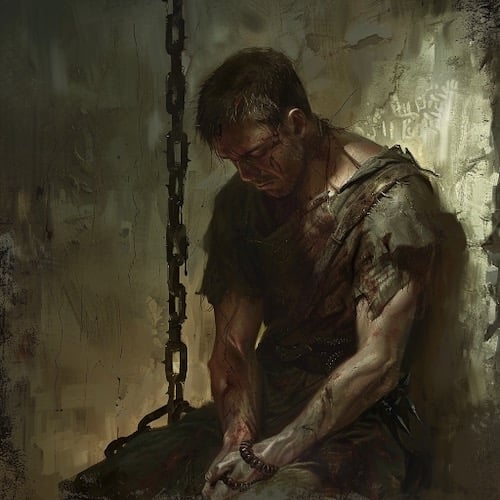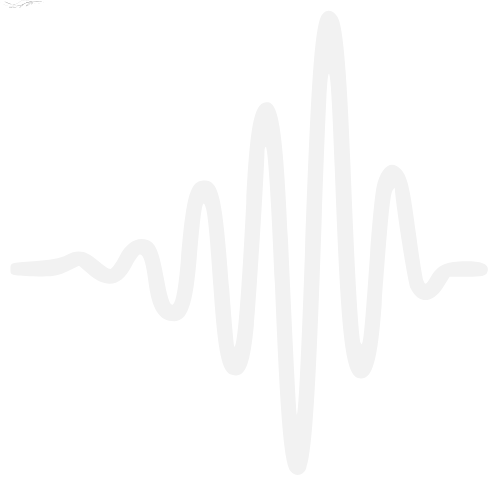From Shadows to Sunlight
Edward's Vindication
SPIRIT OF AUSTRALIA

In the scorching summer of 1792, the fledgling colony of New South Wales lay beneath a merciless sun, its landscape both breathtaking and brutal, a land of stark contradictions. Its rugged terrain, with vast, unending horizons and rich, untamed wilderness, painted a picture of untold possibilities. Yet, for those who had been forcibly uprooted and transported across the world, this beauty was overshadowed by the harshness of their new reality. The land, for all its wild splendour, was unyielding and indifferent to the suffering of the convicts who toiled upon it.
Among these exiled souls was Edward Lang, a young man from London, whose life had taken a catastrophic turn. A single moment of despair, driven by the gnawing hunger of his family, had propelled him into the unforgiving hands of the law. In a city where poverty was a sin punishable by the harshest means, Edward's attempt to steal a loaf of bread had seen him branded a criminal, his sentence not merely a punishment but a banishment from all he held dear.
Transported to New South Wales, Edward found himself ensnared within the relentless gears of colonial retribution, a cog in a vast machine designed to crush the spirit and extract labour. The land that promised new beginnings to free settlers was, for convicts like him, a prison without walls, its beauty marred by the chains of forced servitude. Every sunrise brought with it the harsh reality of his existence, each day a relentless cycle of gruelling work, meagre rations, and the ever-present watchful eyes of the guards, embodiments of the authority that had torn him from his former life.
The stark contrast between the land's natural allure and the cruel conditions of his captivity was not lost on Edward. The vibrant blues of the sky, the rich greens of the bushland, the stark, rugged outlines of the distant Blue Mountains – all these served only to underscore the chasm between the world he had lost and the one in which he now suffered. The beauty of New South Wales, with its exotic flora and fauna and its vast, open spaces, was an ironic backdrop to the grim, oppressive reality of the convict experience.
Separated by thousands of miles from the grimy, crowded streets of London, Edward was isolated not just by geography but by circumstance. Here, in this distant land, he was stripped of his identity, reduced to a number, a pair of hands to be worked until they bled. The dreams he had harboured, of love, of family, of a simple, honest life, had been extinguished, snuffed out by the harsh decree of a court that saw him as less than human.
Yet, within this crucible of suffering, Edward's spirit, though battered, began to forge a new resolve. The very extremity of his plight, the very vastness of the land that held him captive, instilled in him a stubborn determination. If this land was to be his prison, it would also be his proving ground. Amidst the backbreaking labour and the relentless sun, Edward Lang's resolve hardened, shaping him into someone who could not only endure but who vowed, against all odds, to forge a new destiny from the depths of despair.
The perilous journey to the remote shores of New South Wales was a chilling prelude to the grim future that lay ahead, a voyage marred by suffering and despair, foretelling the harsh reality that awaited the convicts upon their arrival. At the heart of Edward Lang's personal hell was Sergeant William Bracken, a figure whose very presence seemed to drain the light from the world around him. Bracken, with eyes as cold as the ocean depths and a smirk that twisted his features into a cruel caricature of amusement, embodied the merciless spirit of the penal system.
Sergeant William Bracken, a figure whose name became synonymous with fear and cruelty among the convicts of New South Wales, wielded his authority with ruthless precision. His methods of torment were diverse and relentless, designed not just to punish but to degrade and dehumanise. Bracken's reign of terror was indiscriminate, targeting men and women, and even children, alike, breaking spirits with a combination of physical brutality and psychological warfare. His favourite tools of torture included the lash, which he wielded with sadistic pleasure, each strike leaving welts and scars, a permanent reminder of his power. For those who dared defy him, solitary confinement in the claustrophobic darkness of tiny, stifling cells became their cruel punishment, where the lack of light, air, food, water and human contact was intended to break their will. The echoes of their suffering served as a grim reminder to all: defiance would be met with unspeakable cruelty under Bracken's watch.






From the moment he laid eyes on Edward, Bracken seemed to sense a spirit that irked him, an innate resilience that he took as a personal challenge to break. The young convict, already burdened by the chains of his fate, became the focus of Bracken’s malevolence, a target for his sadistic tendencies. Each day of the long, treacherous voyage, Edward was subjected to Bracken's brutal whims, the guard's heavy hand leaving marks that were both physical and psychological. The beatings were relentless, a cruel and constant reminder of Edward's powerless state, each blow aimed not just to punish but to humiliate, to erode the last vestiges of his dignity.
Nightfall brought no respite; instead, it was a time when Bracken's threats would seep into Edward's mind, insidious and chilling. In the darkness of the hold, where the only light was the dim glow of lanterns swaying with the ship's rhythm, Bracken's words would cut through the murmur of other convicts, a venomous undertone to the symphony of suffering. He whispered promises of future agony, painting vivid, gruesome pictures of the life that awaited them in the new colony, a life where he vowed Edward's torment would be unending.
This psychological torture was as debilitating as the physical abuse, perhaps even more so. The uncertainty of what lay ahead, coupled with the daily onslaught of cruelty, left Edward and his fellow convicts in a state of constant fear and despair. Bracken's presence loomed over them like a dark cloud, a portent of the misery and dehumanisation that defined their existence.
As the ship cut through the waves, drawing ever closer to the distant land that promised only further anguish, Edward's spirit was tested to its limits. Yet, within him, a defiant flame continued to flicker, refusing to be extinguished by the ocean's chill or Bracken's malice. This journey, harrowing though it was, became the crucible that forged Edward's indomitable will, a will that would one day rise against the very forces that sought to crush it.
Upon arrival, life in New South Wales proved to be as brutal as the journey. Assigned to a backbreaking chain gang, Edward's every moment was under the watchful, sadistic eye of Sergeant Bracken, who seemed to relish the authority the isolated colony afforded him. Bracken's methods were calculated to break not just the body, but the spirit, using fear and pain as his tools of governance. Despite this, Edward's resolve only hardened; each lash, each jeer from Bracken, steeled his determination not to let this man, or this place, destroy him.
As the relentless wheel of time ground onwards, the landscape of Edward Lang's life was etched with the passing seasons, each cycle of the sun marking his continued survival against the harsh backdrop of New South Wales. The physical scars that laced his skin, a brutal cartography of pain endured, served as constant reminders of his dark days of bondage. Each line, each mark, told a silent story of suffering, of the whip's kiss, and the chain's cruel embrace. Yet, they were also emblems of his resilience, indelible proof of a man who refused to be broken.
Beneath the exterior marked by the passage of time and torment, Edward's spirit burned with an undiminished flame. Within the core of his being, untouched and unyielding, dwelled a fierce defiance, a stubborn refusal to submit to the despair that sought to engulf him. This inner strength, more resilient than the steel of his chains, was fuelled by a deep-seated conviction that transcended the immediacy of his suffering. In the darkest nights, when the chill of the damp cell seeped into his bones, and the silence around him was filled with the ghosts of his past, Edward held tightly to the lifeline of hope that one day, the scales of justice would tip in his favour.
This unwavering belief became the beacon that guided him through the tempest of his trials. With every unjust punishment, with every lash that tore at his flesh, Edward's resolve only solidified. The pain became a crucible, forging within him a determination that was as much a shield as it was a weapon. It was this inner fortress that rendered him impervious to the attempts to crush his spirit.
Edward's journey through those gruelling years was a battle fought in the silent chambers of his heart, a struggle to maintain the essence of who he was in the face of relentless attempts to erase it. The very act of surviving, of retaining a sense of self amid such dehumanisation, was a quiet rebellion against the system that sought to reduce him to nothing more than a number, a body to be used and broken.
In those moments of solitude, when he allowed himself to look beyond the walls of his confinement, Edward envisioned a future where he stood not as a condemned man, but as one vindicated. The dream of justice, of vindication, became the lighthouse guiding him through the stormy seas of captivity. This singular thought, that one day justice would be his, was the anthem that played over the discordant notes of his captivity, a symphony of hope that sustained him, whispering of a day when the world would see him not as a mere convict, but as a man who endured, survived, and ultimately triumphed over the injustices that sought to define him.
The turning point came unexpectedly. In 1799, after years of enduring the unimaginable, Edward was granted a ticket of leave. It was not freedom, not truly, but it was a beginning, a chance to rebuild from the ruins of his past. With nothing but his wits and an unwavering resolve, Edward slowly clawed his way from the depths of destitution, leveraging the only thing he had left: his mind.
In the years following his emancipation, Edward Lang embarked on a journey of self-reinvention that saw the rise of a man forged from the crucible of hardship into a paragon of resilience and determination. The scars that marred his body became the only remnants of the battered convict he once was, as he poured his soul into the burgeoning opportunities that the raw, untamed landscapes of New South Wales offered.
Timber, the very backbone of the growing colony, became Edward's vessel to redemption and prosperity. Recognising the demand for sturdy construction materials in a settlement expanding at an unprecedented rate, Edward leveraged the skills he had honed during his years of forced labor. He started modestly, with a small team of fellow emancipated convicts, a band of men deemed outcasts by society yet bound by a shared vision under Edward's leadership.

Through sheer perseverance, Edward's venture grew from a makeshift operation into a thriving enterprise. His business acumen, coupled with an innate understanding of the land and its resources, allowed him to navigate the complexities of the timber industry successfully. Edward's commitment to fairness and his genuine concern for the welfare of his workers set him apart, slowly cementing his reputation as a businessman of integrity and respectability.
As his wealth grew, so too did Edward's influence within the colony. He became known not just as a successful timber merchant but as a pillar of the community, a man who, despite his dark past, contributed significantly to the colony's development. His transition from convict to community leader was emblematic of the very essence of the Australian spirit – the belief in the possibility of change, and the power of a second chance.
With his rise in social standing, Edward began to wield considerable power in the political arena of the colony. His insights, born from years of survival against the odds, brought a fresh perspective to the burgeoning political landscape of New South Wales. Edward found himself involved in decision-making processes, advocating for the rights and welfare of those who, like him, had been brought to these shores in chains. His voice, once silenced by the status of a convict, now resonated in the halls where the future of the colony was debated and determined.
The transformation of Edward Lang was complete. From the depths of despair, he had risen to become a figure of authority and respect, a symbol of the redemption that the new land promised. His journey was a testament to the indomitable human spirit, and his legacy a reminder that even the most broken of men could rebuild themselves anew. In the once-battered convict turned respected businessman and political figure, the colony saw the embodiment of their collective hopes and dreams, a living proof that in New South Wales, one could indeed turn the tides of fate and carve out a destiny of their own making.
It was then, from this pinnacle of success, that Edward turned his attention to the unfinished business of his past. Sergeant William Bracken, now retired and living in obscurity, had become a distant, unpleasant memory for most. But not for Edward. With meticulous planning, Edward used his influence to draw Bracken back into the public eye, not to humiliate or harm him physically, but to expose his cruelty for all to see.
Through a series of calculated moves, Edward Lang, now a figure of considerable influence in New South Wales, meticulously engineered the ascent of Sergeant William Bracken to a public position of minor authority. This role, seemingly a gesture of goodwill, was in fact the first step in Edward’s intricate plan of retribution. It was a position that brought Bracken back into the public eye, a stage from which his impending fall would be all the more spectacular and humiliating.
Edward, with the patience and precision of a master strategist, began to weave the web of Bracken’s undoing. He collected testimonies from fellow survivors, men whose bodies and spirits had been marked by Bracken's cruelty, men who had suffered in silence, their stories buried beneath the weight of their chains. With Edward’s encouragement and support, these forgotten voices found the strength to speak out, their accounts forming a damning chorus against the man who had once seemed untouchable.
As the pieces fell into place, Edward used his contacts in the burgeoning press of the colony to ensure that the revelations about Bracken's past would not go unnoticed. When the story broke, it was not just a mere column hidden in the back pages but a scathing front-page exposé that detailed Bracken's atrocities with chilling precision. The public, once oblivious to the man's dark history, was now repulsed by the revelations. The newspapers painted Bracken as a monster, a man who had hidden behind his badge and uniform to inflict pain and suffering without consequence.
The aftermath was cataclysmic. Bracken, stripped of his newfound position amid public outcry, faced the ignominy of a trial where his past actions were laid bare for all to see. The testimonies of Edward and the other survivors, once powerless convicts, now held sway in the court of public opinion, their words sealing Bracken’s fate.
Bankruptcy soon followed for Bracken, as his ill-gotten gains, amassed through years of exploitation and corruption, were forfeited. The wealth he had accrued through fear and suffering was dismantled, piece by piece, until nothing remained but the shell of a man who had once wielded such unwarranted power. Consigned to penury, Bracken found himself ostracised, a pariah in the very society over which he had once lorded.
The public humiliation was relentless and total. Bracken, who had thrived on the fear and subjugation of others, now walked the streets under the weight of collective disdain. Those who once bowed in fear now looked on with contempt. His name, once a byword for authority and fear in the convict community, became synonymous with cruelty, betrayal, and disgrace.
In this meticulously orchestrated downfall, Edward Lang found no joy in his former tormentor's suffering. Yet, he recognised it as a necessary act of justice—a fitting retribution not only for the years of torment he had endured but for all those who had suffered under Bracken’s hand. In bringing about Bracken’s downfall, Edward not only exacted his revenge but also laid to rest the ghosts of his past, allowing him, and others like him, to finally move forward, unburdened by the chains of their shared trauma.
In the end, Edward Lang did not need to resort to the cruelty that had been dealt to him. His revenge was exacted not through violence, but through justice, shining a light on the darkness of the past. As he stood watching Bracken's descent into ignominy, Edward realised that the best revenge was not to replicate the evil done to him, but to rise above it, to live a life defined not by bitterness and hatred, but by resilience and a desire for a just world. And in this realisation, Edward found not just freedom from the chains of his past, but true liberation of his spirit.
© Peter Pickering 2024. www.peterpickering.com
This tale, steeped in the harsh realities of early colonial Australia, chronicles Edward Lang's journey from a convict under the heel of tyranny to a man who redefines his destiny, embodying the indomitable human spirit's capacity for resilience, transformation, and ultimate vindication. A good outline for an epic TV series methinks. Heck, let's make a movie! Where's Spielberg?




